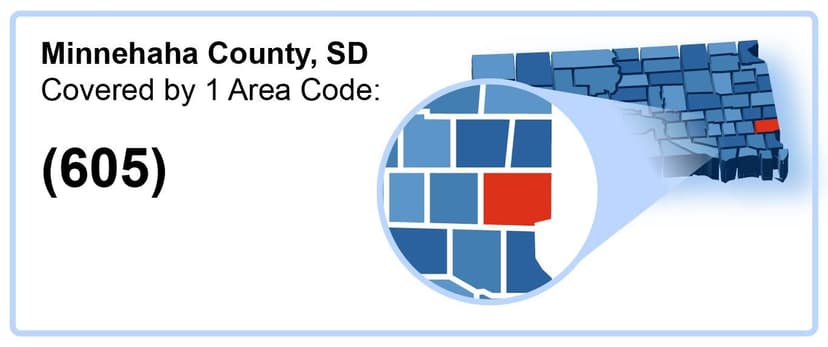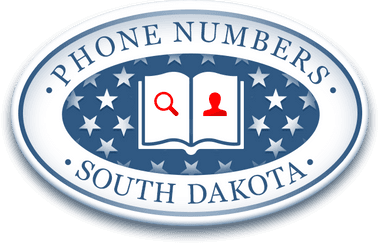What are the Best Cell Phone Plans in Minnehaha County?

Under the North American Numbering Plan (NANP), each geographical area in North America is divided into Numbering Plan Areas (NPAs), and each of these NPAs is assigned area codes. Area codes are three-digit codes that identify certain telephone areas and precede ten-digit telephone numbers. Residents can conduct area code lookups using reverse phone lookup tools.
Area Code 605
Area code 605 is the area code that covers the entire South Dakota. It was one of the initial area codes created by the Bell System and AT&T in 1947 and one of the single-state, single-area code areas. Some of the cities and towns this area code covers are Sioux Falls, Aberdeen, Pennington, Wagner, Pierre, Mobridge, Brookings, etc.
In Minnehaha County, there are four major phone networks, which are AT&T, T-Mobile, Verizon, and Sprint. Considering these four, Verizon has the best coverage, with 98%. The next is AT&T with 70%, followed by T-Mobile with 58%. Sprint has the least network coverage with 42%. Regardless of the network coverage quality, certain factors such as bad weather and population density may negatively affect the quality of the network in the county.
According to the 2018 National Center of Health Statistical Survey, an estimate of 60.9% of the South Dakota adult population used only wireless telephones, while an estimate of 3.9% of the South Dakota adult population used only landlines. On the other hand, an estimated 69.8% of the South Dakota minors used only wireless telephones, while just 2.2% of the minors used only landlines. From the survey, it is obvious that adults and minors alike prefer to use wireless telephones instead of landlines for telephony services in South Dakota.
Another technological innovation residents and businesses in Minnehaha County are taking cognizance of is Voice over Internet Protocol (VoIP). VoIP is a technology that makes it possible to deliver voice and multimedia messages over an internet connection. Businesses particularly choose VoIP due to its flexibility, increased mobility, cost-effectiveness, and advanced features. Some advanced features of VoIP include but are not limited to conference calling, call screening, automated attendant, call recording/monitoring, call forwarding/voicemail, and Caller ID spoofing.
What are Minnehaha County Phone Scams?
Minnehaha County phone scams are scams aimed at residents, both young and old, to steal from them and fraudulently obtain their personal and financial information over the phone. Scammers in Minnehaha County adopt diverse means of scamming residents. They maximize the use of technological innovations that will aid them in defrauding residents undetected. Technological innovations such as Caller ID spoofing and robocalls are top on the list. Robocalls help scammers send pre-recorded messages in bulk to residents. On the other hand, scammers use Caller ID spoofing to block their Caller IDs and impersonate legitimate organizations and persons by taking on their Caller IDs.
For this reason, the Federal Communications Commission (FCC) and Federal Trade Commission (FTC) educates residents on illegal Caller ID spoofing, phone scams, and how to activate call-blocking tools and features.
To answer the question, “who is this number registered to?” Minnehaha County residents can take advantage of reverse phone lookup services free, which also offers call-blocking options.
Some commonly perpetrated phone scams in Minnehaha County are:
What are Minnehaha County Medicare Scams?
Medicare scams occur when scammers impersonate Medicare personnel. They claim that the recipient is to be issued a new card and a new number, and for that reason, they ask the recipient to verify their current Medicare number or demand a processing fee for the new card. They could also claim that there have been suspicious activities on the recipient’s account and need to verify the recipient’s identity so benefits can be retained. These scammers adopt diverse tactics to get residents to divulge personal information or make payments.
This scam is on the rise in Minnehaha County, and residents are warned to be wary. Residents should understand that scammers often use Caller ID spoofing to block their Caller IDs; hence not all Caller IDs can be trusted. Residents can conduct reverse phone number lookups to uncover the identity of scammers. Residents are advised against giving out personal and financial information.
Residents may contact Medicare on 800-633-4227 to confirm claims. Also, residents can report identity theft to the Federal Trade Commission (FTC) online or the South Dakota's Consumer Protection Division on 1-800-300-1986.
What are Minnehaha County Sheriff Department Scams
In Minnehaha County Sheriff Department scams, scammers impersonate the Minnehaha Sheriff Department’s officers. They manipulate their Caller IDs to that of actual officers and even adopt their names to appear believable. Sometimes, they also use robocalls with prompts asking that the recipients leave messages in the general mailbox or be connected to a deputy’s personal mailbox. Scammers inform recipients of warrants in their names and demand that payment be made to avoid arrest. Payment demanded is to be made through gift cards, prepaid debit cards, wire transfers, etc.
The Minnehaha County Sheriff's Department has warned residents to be wary of such scams. The department will never contact residents to inform them of warrants in their name nor demand payment to avert arrest. Residents are advised to hang up such calls immediately and engage no further. Residents can always determine the identity of callers by utilizing the reverse phone lookup tools free. Residents who wish to confirm warrant claims can do that with the Sheriff’s department online. Also, these scams can be reported to the Sheriff’s department at 605-367-4300.
What are Minnehaha County Lottery Scams?
Lottery scams, a type of advance fee fraud, occur when scammers call residents to inform them of supposed prizes or lotteries won, which such residents never entered for. They inform residents of certain fees and taxes to be paid to claim prizes/lotteries. They ask the recipients to pay these fees and taxes via wire transfers to foreign accounts, gift cards, bitcoins, etc. They entice residents with winnings such as cash, appliances, luxury trips, etc. Most times, scammers ask their victims to keep the winnings confidential for security reasons and to avoid missing out on them.
Residents are advised to conduct thorough research on the lotteries in question and understand that nothing can be won if there was no prior registration or purchase of tickets, as the case may be. Residents can conduct phone number lookups using reverse cell phone lookup services to answer the question “who called me?.” In addition, no legitimate lottery requires payment of any fee to claim the prize won. Residents should never share their personal information, credit card information, or account information.
What are Minnehaha County Charity Scams?
Charity scams happen when scammers pretend to be representatives of charitable organizations to extort and defraud residents. This scam occurs a lot during natural disasters like floods when charitable organizations help needy individuals and households. Scammers disguise themselves as legitimate charitable organizations by duplicating the Caller IDs of legitimate charitable organizations. Residents can carry out phone lookup free with reverse phone look up tools to find out whether a Caller ID is spoofed or not.
Residents are advised to evaluate, research and verify organizations before donating. It is in the best interest of residents to make donations to reputable charitable organizations to avoid charity scams.
What are Robocalls and Spam Calls?
An automated call that delivers pre-recorded messages to people through an auto dialing system is a robocall. Robocalls are essentially for the dissemination of information or for making emergency announcements. Majorly, they are associated with political parties and telemarketers. Robocalls can be either legal or illegal as scammers misuse and take advantage of this technology. Some robocalls contain directives for recipients to press certain numbers to stop receiving the calls or to speak with a live agent. Such instructions should be ignored to avoid future robocalls.
The Federal Communications Commission (FCC) regulates the use of robocalls through the Telephone Consumer Protection Act (TCPA) of 1991. It provides that no robocall should be made without the recipients’ prior consent. If flaunted, such robocalls will be considered illegal and can be reported. However, the Federal Trade Commission (FTC) points out certain robocalls that can be made without prior consent, and they are:
- Robocalls for political campaigns
- Robocalls for debt collection
- Robocalls by legitimate health institutions
- Purely informational robocalls
- Robocalls by charitable organizations
Spam calls, like robocalls, are unwanted calls sent in bulk to disseminate information that is irrelevant to the recipients. Spam calls are not necessarily scams, but they are sent without prior consent and constitute nuisances to the recipients.
You can take the following steps to combat robocalls:
- Hang up immediately if you mistakenly pick a robocall and ignore any directives given during the call.
- Make use of a good reverse phone lookup application and website to detect and block robocalls. You can also block phone numbers using in-built blocking features on your phone or call-blocking options provided by your telephone service provider.
- Do not hesitate to register all personal phone numbers on the National Do Not Call Registry to minimize robocalls. Complaints can be made 31 days after the registration.
- Report all complaints on robocalls to the FTC through the online complaint assistant or call 1-888-382-1222.
How to Spot and Report Minnehaha County Phone Scams?
The diversity and evolving nature of scams in Minnehaha County call for residents to be wary of scammers and scam calls in order not to fall victim to these scams. Therefore, there is a need to know and understand red flags to look out for. Some of these red flags are:
- The caller demands a fee upfront payment for a supposed prize and lottery win. Hang up such calls immediately and report to the relevant law enforcement agency.
- The caller demands payment through gift cards, wire transfers, bitcoins, etc. No legitimate organization will ask for payment through any of these means as these payment methods are untraceable and irretrievable.
- The caller threatens with deportation, arrest, and license revocation for non-compliance. Contact the organization directly on their website or put a call through to their official number.
- The caller calls with a sense of urgency and pressurizes the recipient into making hurried decisions.
- The caller asks you to disclose your sensitive information such as account number, date of birth, mother’s maiden name, social security number, etc. Legitimate organizations will not demand the disclosure of sensitive information over the phone for any reason.
- An unknown caller asks that the call is kept secret and no disclosure should be made to a third party. Utilize the reverse phone number lookup tools to identify unknown callers and answer the question “who called me?”
- The caller demands immediate payment of a debt owed. Residents must understand that legitimate organizations do not call unexpectedly to demand payment without prior notice. Hang up immediately and contact the appropriate law enforcement agency.
Residents of Minnehaha County can contact any of these government agencies to report scams:
Minnehaha County Sheriff’s Department - Phone scams can be reported by calling 605-367-4300.
South Dakota Consumer Protection Division of the Attorney General’s Office - Report phone scams by filing the online complaint form. You may also print, fill out, and mail the completed complaint form. Residents who want the form mailed to them may call 605-773-4400 or 1-800-1986 (within the state). Report any charitable scams to the Consumer Protection Division of the Attorney General’s office on 605-773-4400 or 1-800-1986 or via email.
Federal Trade Commission - Phone scams can be reported through the online consumer complaint assistant. In addition, register your phone numbers on the FTC’s National Do Not Call Registry to cut down unwanted calls.
Federal Communications Commission - Victims of phone scams, unsolicited robocalls, Caller ID spoofing, and identity theft can be reported by completing the online complaint form or by calling the FCC on 1-877-382-4357.
